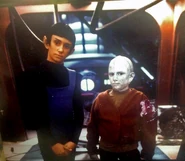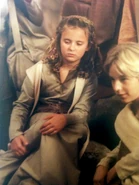m (+awards) |
m (→Star Trek awards: grm.) |
||
| Line 192: | Line 192: | ||
==''Star Trek'' awards== |
==''Star Trek'' awards== |
||
| − | For his work on ''Star Trek'' Rick Berman received the following |
+ | For his work on ''Star Trek'' Rick Berman received the following award nominations in the various writing categories: |
===Emmy Award=== |
===Emmy Award=== |
||
Berman received the following [[Emmy Award]] nomination in the category "Outstanding Drama Series": |
Berman received the following [[Emmy Award]] nomination in the category "Outstanding Drama Series": |
||
Revision as of 17:36, 1 November 2013
Template:Realworld Richard Keith Berman (born 25 December 1945; age 78) is a veteran writer and producer of American television. He was the executive producer of Star Trek: The Next Generation (1991-1994) and co-creator of Star Trek: Deep Space Nine, Star Trek: Voyager and Enterprise. He also produced and co-wrote four Star Trek films.
Biography
Early life and career
Born in New York, New York on December 25, 1945, Rick Berman earned a bachelor's degree in speech from the University of Wisconsin-Madison in 1967.
In 1970, Berman worked as production assistant on John Lennon and Yoko Ono's experimental short film, Fly, which was one of his earliest jobs in filmmaking. [1]
A prolific documentary filmmaker in the 1970s, Berman traveled extensively throughout the world, visiting over ninety countries. As an independent producer in the 1980s, Berman produced several informational series for HBO and PBS, including The Big Blue Marble for which he won an Emmy Award in 1982. Coming to Paramount Pictures in 1984, Berman served as director of current programming and executive director of dramatic programming during which time he supervised television series including MacGyver, Family Ties, and Cheers – appearing in the final episode of the latter as a bar patron.
Star Trek
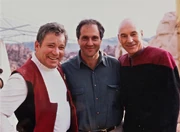
Berman on the set of Star Trek Generations with William Shatner and Patrick Stewart in 1994
In November 1986, recently promoted to vice president of long form and special projects for Paramount Network Television, Berman was called to a meeting with Gene Roddenberry, early in the development of his television spin-off of Star Trek. Berman recalled the meeting in his foreword for Star Trek: The Next Generation - The Continuing Mission:
- "When I arrived at the meeting, Gene's office was filled with a number of high-ranking studio executives. Gene didn't want to do whatever they were proposing. Gene pounded the desk and the executives pounded back. Gene raised his voice and the executives raised theirs even louder. In the midst of all this pounding and shouting, I sat with my mouth shut. It wasn't that I had chosen this as a tactic, it was simply that I had no idea what they were talking about. But I clearly remember that on at least two occasions during that meeting, Gene's eyes locked on to mine for an instant and I responded with a slightly mischievous smile. Later, Gene Roddenberry would tell me how that smile was filled with subtext... I actually believe it was nothing more than a slightly mischievous smile."
Upon their second meeting, the two men discussed their travels – Roddenberry with the army and Berman as a documentary filmmaker – Berman described the meeting as a bonding experience, "love at second sight". Within days, Berman was offered a position as a producer on the fledgling Star Trek sequel, a move which would require him to resign his post as an executive and return to production. Berman described his new working relationship with Roddenberry as a blending of the Star Trek creator's fantastical imagination with his more "Earthbound" sensibility.
Berman worked closely with fellow supervising producer Bob Justman, casting the new crew of the USS Enterprise-D and campaigning heavily to secure Patrick Stewart in the lead role in what would become Star Trek: The Next Generation. (Star Trek: The Next Generation - The Continuing Mission)
The Next Generation and Deep Space 9
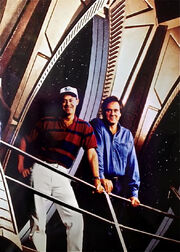
Berman and Michael Piller on the set of Deep Space Nine
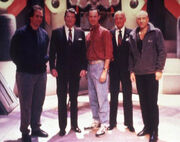
Berman with Ronald Reagan in 1991.
With the departure of Bob Justman following TNG's first year and Roddenberry's declining involvement in the day-to-day production of the series, Berman quickly ascended to the role of executive producer, a title he held alone following Roddenberry's death in 1991.
Overseeing all aspects of the production of The Next Generation, Berman described his position as monitoring both the aspects of the series that changed and those that remained the same, in order to retain a balance. "My job also includes monitoring the 'degree of bend'... letting the shows and the films evolve, but keeping Gene's vision true to course. I'm not quite fluent yet, but I'm getting there."
Berman would later recall, "I learned Gene's vision directly from Gene. It wasn't my vision of the future, but it was at the foundation of Star Trek. It was like learning a foreign language. I studied it." (A Vision of the Future - Star Trek: Voyager, p. 3) Keeping a small bust of Roddenberry on his desk, Berman often referred to what Roddenberry would have done had he survived to continue running TNG. When any one of the writers would propose an idea that Berman felt was explicitly contrary to that edict, Berman would "blindfold" the bust. (Star Trek: The Next Generation Companion)
With the success of TNG and mounting production costs, Paramount soon approached Berman and his associates to ready yet another spin-off, one to run concurrently with TNG before supplanting it on the airwaves. This would be Rick Berman's first "created by" credit and it would come to be called Star Trek: Deep Space Nine.
Despite criticism that the second Star Trek spin-off, co-created by Berman and Michael Piller, was darker and grittier than previous Trek outings, Berman consistently and steadfastly disagreed. In the Star Trek: Deep Space Nine Companion, Berman recalls:
- "I was asked to create and develop a series that would serve as a companion piece to The Next Generation for about a year and a half, and then TNG would go off the air and this new show would continue. So I asked Michael Piller to get involved, and we put our heads together. I really never had the opportunity to discuss any ideas with Gene. This was very close to the end of Gene's life, and he was quite ill at the time. But he knew that we were working on something, and I definitely had his blessing to develop it."
The movies and Voyager
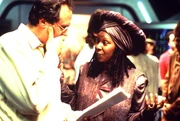
Berman on the set of Generations with Whoopi Goldberg
Following the end of the seven season run of The Next Generation, Rick Berman's duties as executive producer segued into the responsibility of overseeing the continuation of that series on the big screen. With the process of creating a TNG movie beginning as early as 1992, the situation was nevertheless rushed according to Berman in the Star Trek: The Next Generation Companion:
- "The television studio people knew me and how I worked, and trusted me after seven years. But the feature film people didn't, and I had to develop that rapport with them... originally they wanted us to have it out in March. Then they said Christmas, and then Thanksgiving. It just kept creeping up on us."
One of the few producers to successfully transition from television to feature films, Berman's eventual Star Trek Generations was a financial success, securing his place in the world of Trek features.
Despite the general prosperity of Deep Space Nine, Paramount pressured Berman for yet another television series. So close to the end of TNG and running alongside DS9, Berman admitted in a 2006 interview that he felt many aspects of what came to be Star Trek: Voyager, unfortunately, didn't work.
- "I think a lot of things did work. It was the first attempt to do a Star Trek show on a starship that was not the Enterprise. It was a show that was pushed on the public a little too quickly, which was difficult. It was very difficult to have a female lead who could have the authority of a Starfleet captain and simultaneously have the nurturing feminine qualities that we were all after. It was a difficult thing to do. I think that may have been part of the motivation for bringing in Jeri Ryan... It was something we tried to do, something I think we did successfully, but not as successfully as we'd hoped. I think there may have been a problem with the whole idea of throwing the ship to the other side of the galaxy, because I think Star Trek, at its soul, is a show about heading outward into new places and discovering new things, and this was a show about heading back and trying to find our way home. We hoped that the amount of adventure and exploration would be the same on our journey back home, but I think something was lost on their way home."
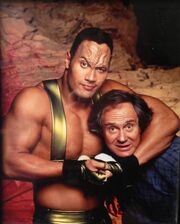
Posing with The Rock
Yet again citing studio pressure for a quickened turn-out pace, Berman said:
- "I again asked them for a little breathing room, that maybe it wasn't a good idea to slap a new show on the air in what was going to be the third season of Deep Space Nine. Maybe we needed to separate them a little bit. It was very clear to me they wanted another show... In a very polite and abstract way I was told that if I refused to do it, they respected that, but that they'd find someone else who would..."
While Voyager would fail to achieve the same audience numbers that Star Trek: The Next Generation and even Deep Space Nine once did, Paramount and UPN still considered it a profitable and desirable commodity. With the end of Voyager's seventh season, Berman was once again approached to create a new series - one to air in the fall of 2001, mere months after the final broadcast of Voyager.
Enterprise and Nemesis
Partnering with TNG veteran Brannon Braga, Berman co-created and executive produced Enterprise, arguably the most controversial of his endeavors. Credited for polarizing the apparently dwindling Star Trek fan base, Enterprise was, at Berman's insistence, drastically different from previous outings.
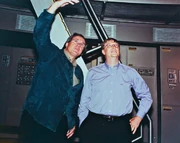
Berman tours the Enterprise sets with Bill Gates
Debuting with a relatively large audience, Enterprise quickly lost viewership and inspired criticism of both the series and its creators, with fans criticizing alleged violations in established continuity. With the failure of Star Trek Nemesis at the box office in 2002, outspoken critics called for the removal of Berman.
- "Contrary to the people on the Internet who seem to think I never cared very much about the Star Trek franchise, I did and I do. I felt that if someone was going to keep it true to Gene Roddenberry's vision it would probably be better me than for me to bow out."
Nevertheless, with the approach of the end of the fourth season of Enterprise, Paramount and UPN announced its cancellation and the apparent end of Rick Berman's tenure as the overseer of Star Trek productions. With the end of Enterprise, word came from Berman and Paramount that an eleventh feature was in the works, with Berman partnering with screenwriter Erik Jendresen on what was tentatively titled Star Trek: The Beginning. However, by April 2006, new leadership at Paramount suggested that Berman's involvement in Star Trek had ended and the producer had moved on to other projects.
Speaking with Star Trek Monthly, Berman described his departure:
- "Without sounding clichéd I'm not going to say never, but I assume that I have produced my last Star Trek, especially with the interest that Paramount has gotten from J.J. Abrams to do another movie, which, if successful, could lead to other television shows... I have nothing to be ashamed about. We created 624 hours of television and four feature films and I think we did a hell of a job. I'm amazed that we managed to get 18 years of the kind of work that everyone involved managed to contribute, and it's certainly more than anyone could have asked for."
The future
While Berman has been vague about future non-Star Trek projects, he retained his office on the Paramount lot until December 2006. Before that time, he continued to develop television series.
- "There are a number of shows that we're developing that have slight elements of the supernatural or science fiction, but none of them have spaceships!"
In an interview with Star Trek Magazine conducted not long before his departure, Berman indicated that he had begun writing a memoir about his twenty-two years with Paramount, and his time at Star Trek.
- "I have started writing a book because I realized that since 1986, when Gene Roddenberry asked me to get involved and work with him on this thing, the number of stories that I have accumulated is amazing." [2]
Writing credits
Episodes
- TNG:
- "Brothers"
- "Ensign Ro" (story with Michael Piller)
- "Unification I" (story with Michael Piller)
- "Unification II" (story with Michael Piller)
- "A Matter of Time"
- DS9:
- "Emissary" (story with Michael Piller)
- "The Maquis, Part I" (story with Michael Piller, Jeri Taylor, and James Crocker)
- "The Maquis, Part II" (story with Michael Piller, Jeri Taylor, and Ira Steven Behr)
- VOY:
- "Caretaker" (story with Michael Piller and Jeri Taylor)
- "Hope and Fear" (story with Brannon Braga and Joe Menosky)
- "Timeless" (story with Brannon Braga and Joe Menosky)
- "Think Tank" (story with Brannon Braga)
- "Equinox" (story with Brannon Braga and Joe Menosky)
- "Equinox, Part II" (story with Brannon Braga and Joe Menosky)
- "Fury" (story with Brannon Braga)
- "Endgame" (story with Kenneth Biller, and Brannon Braga)
- ENT:
- "Broken Bow" (with Brannon Braga)
- "Fight or Flight" (with Brannon Braga)
- "Strange New World" (story with Brannon Braga)
- "Unexpected" (with Brannon Braga)
- "Terra Nova" (story with Brannon Braga)
- "The Andorian Incident" (story with Brannon Braga and Fred Dekker)
- "Shadows of P'Jem" (story with Brannon Braga)
- "Shuttlepod One" (with Brannon Braga)
- "Fusion" (story with Brannon Braga)
- "Rogue Planet" (story with Brannon Braga and Chris Black)
- "Acquisition" (story with Brannon Braga)
- "Oasis" (story with Brannon Braga and Stephen Beck)
- "Detained" (story with Brannon Braga)
- "Vox Sola" (story with Brannon Braga and Fred Dekker)
- "Fallen Hero" (story with Brannon Braga and Chris Black)
- "Desert Crossing" (story with Brannon Braga and André Bormanis)
- "Two Days and Two Nights" (story with Brannon Braga)
- "Shockwave" (with Brannon Braga)
- "Shockwave, Part II" (with Brannon Braga)
- "Carbon Creek" (story with Brannon Braga and Dan O'Shannon)
- "A Night in Sickbay" (with Brannon Braga)
- "Marauders" (story with Brannon Braga)
- "The Seventh" (with Brannon Braga)
- "The Communicator" (story with Brannon Braga)
- "Vanishing Point" (with Brannon Braga)
- "Precious Cargo" (story with Brannon Braga)
- "Stigma" (with Brannon Braga)
- "The Crossing" (teleplay with Brannon Braga, story with Brannon Braga and André Bormanis)
- "Cogenitor" (with Brannon Braga)
- "Bounty" (story with Brannon Braga)
- "The Expanse" (with Brannon Braga)
- "The Xindi" (with Brannon Braga)
- "Carpenter Street" (with Brannon Braga)
- "Harbinger" (story with Brannon Braga)
- "Azati Prime" (story with Brannon Braga and Manny Coto)
- "Zero Hour" (with Brannon Braga)
- "These Are the Voyages..." (with Brannon Braga)
Feature films
- Star Trek Generations (story, with Ronald D. Moore & Brannon Braga)
- Star Trek: First Contact (story, with Ronald D. Moore & Brannon Braga)
- Star Trek: Insurrection (story, with Michael Piller)
- Star Trek Nemesis (story, with John Logan & Brent Spiner)
Producing credits
- Star Trek: The Next Generation ("Encounter at Farpoint" - "When The Bough Breaks") - Supervising Producer
- Star Trek: The Next Generation ("Coming of Age" - "Shades of Gray") - Co-Executive Producer
- Star Trek: The Next Generation ("Evolution" - "All Good Things...") - Executive Producer
- Star Trek: Deep Space Nine - Executive Producer
- Star Trek: Voyager - Executive Producer
- Star Trek: Enterprise - Executive Producer
- Star Trek Generations - Producer
- Star Trek: First Contact - Producer
- Star Trek: Insurrection - Producer
- Star Trek Nemesis - Producer
Star Trek interviews
- TNG Season 1 DVD special feature "The Beginning"
- TNG Season 1 DVD special feature "Selected Crew Analysis" ("Character Notes")
- TNG Season 1 DVD special feature "The Making of a Legend" ("Make-Up")
- TNG Season 1 DVD special feature "Memorable Missions"
- TNG Season 2 DVD special feature "Mission Overview: Year Two" ("Whoopi Goldberg", "Ten Forward", "Gene Roddenberry"), interviewed on 20 September 1988 and 5 September 2001
- TNG Season 2 DVD special feature "Selected Crew Analysis Year Two", interviewed on 18 March 1994
- TNG Season 2 DVD special feature "Departmental Briefing Year Two: Memorable Missions" ("The Measure Of A Man"), interviewed on 18 March 1994
- TNG Season 3 DVD special feature "Mission Overview Year Three", interviewed on 18 March 1994
- TNG Season 5 DVD special feature "A Tribute to Gene Roddenberry" ("Gene Roddenberry Building Dedicated to Star Trek's Creator", "Gene's Final Voyage"), interviewed on 7 June 2002
- TNG Season 6 DVD special feature "Mission Overview Year Six" ("January 1993 Star Trek: Deep Space Nine Debuts"), interviewed on 7 June 2002
- TNG Season 6 DVD special feature "Departmental Briefing Year Six" ("Special Crew Profile: Lt. Cmdr. Data"), interviewed on 5 September 2001
- TNG Season 7 DVD special feature "Mission Overview Year Seven" ("An Ending And A Beginning", "The Final Episode"), interviewed on 18 March 1994 and 7 June 2002
- TNG Season 7 DVD special feature "Starfleet Moments & Memories Year Seven" ("A Unique Legacy", "A Unique Family"), interviewed on 7 June 2002
- TNG Season 7 DVD special feature "The Making of "All Good Things..." Year Seven" ("Writing The Final Episode"), interviewed on 7 June 2002
- TNG Season 7 DVD special feature "Star Trek: Deep Space Nine DVD Preview"
- DS9 Season 1 DVD special feature "Deep Space Nine: A Bold Beginning", interviewed on 7 June 2002
- DS9 Season 1 DVD special feature "Deep Space Nine Scrapbook Year One", interviewed from 9 April 1999
- To Boldly Go
Star Trek awards
For his work on Star Trek Rick Berman received the following award nominations in the various writing categories:
Emmy Award
Berman received the following Emmy Award nomination in the category "Outstanding Drama Series":
- 1994 Emmy Award nomination for Star Trek: The Next Generation, shared with Brannon Braga, Michael Piller, Jeri Taylor, David Livingston, Peter Lauritson, Merri D. Howard, Wendy Neuss, and Ron D. Moore
Hugo Awards
Berman received the following Hugo Award nominations in the category "Best Dramatic Presentation":
- 1995 Hugo Award nomination for Star Trek Generations, shared with David Carson, Brannon Braga, and Ron D. Moore
- 1997 Hugo Award nomination for Star Trek: First Contact, shared with Jonathan Frakes, Brannon Braga, and Ron D. Moore
- 1999 Hugo Award nomination for Star Trek: Insurrection, shared with Jonathan Frakes, and Michael Piller
- 2003 Hugo Award nomination for the episode ENT: "A Night in Sickbay", shared with David Straiton, and Brannon Braga
- 2003 Hugo Award nomination for the episode ENT: "Carbon Creek", shared with James Contner, Chris Black, Brannon Braga, and Dan O'Shannon
External links
- Rick Berman at Wikipedia
- Template:IMDb-link
- Interview at the Archive of American Television

